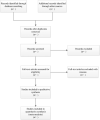Evaluation of walking exercise on glycemic control in patients with type 2 diabetes mellitus: A protocol for systematic review and meta-analysis of randomized cross-over controlled trials
- PMID: 33217794
- PMCID: PMC7676596
- DOI: 10.1097/MD.0000000000022735
Evaluation of walking exercise on glycemic control in patients with type 2 diabetes mellitus: A protocol for systematic review and meta-analysis of randomized cross-over controlled trials
Abstract
Introduction: Hyperglycemia is closely associated with the occurrence of diabetic complications, especially for patients with type 2 diabetes mellitus. Clinical trials indicated that walking exercise could improve glycemic control in patients with type 2 diabetes mellitus, but it is difficult to draw definitive and reliable conclusions due to the small sample size and possible exaggerated efficacy of various individual clinical trials. Therefore, we will conduct systematic review and meta-analysis to assess the current evidence for the efficacy of walking on glycemic control.
Methods and analysis: The databases of PubMed, EMBASE, Web of Science and Cochrane Library will be searched for this review. Cochrane risk-of-bias assessment tool will be applied to assess the risk of bias of included studies. A meta-analysis will be performed according to the Cochrane Handbook for Systematic Reviews of Interventions by using RevMan 5.3 and STATA/SE 14.0 software. Subgroup analysis will be conducted to investigate the sources of heterogeneity. Sensitivity analysis will be performed to assess the reliability and stability of the meta-analysis. Publication bias and small-study effects will be evaluated by a funnel plot and Eggers test if there are at least 10 studies. Additionally, the quality of evidence for this review will be assessed by Grades of Recommendations Assessment, Development and Evaluation (GRADE).
Results: This systematic review and meta-analysis will be to assess the efficacy of walking exercise on glycemic control.
Conclusion: We will provide strong evidence to determine whether walking can improve glycemic control in patients with type 2 diabetes mellitus. This study is supposed to provide references for clinical trials and patients with type 2 diabetes mellitus.
Ethics and dissemination: This study does not require ethical approval. The results of this review will be published in a peer reviewed journal.
Inplasy registration number: INPLASY202090046.
Conflict of interest statement
All authors involved in this work have no conflicts of interest.
Figures
Similar articles
-
Safety and efficacy of Momordica charantia Linnaeus in pre-diabetes and type 2 diabetes mellitus patients: a systematic review and meta-analysis protocol.Syst Rev. 2018 Nov 15;7(1):192. doi: 10.1186/s13643-018-0847-x. Syst Rev. 2018. PMID: 30442186 Free PMC article.
-
Effect of febuxostat on blood pressure in hyperuricemic patients: A protocol for a systematic review and meta-analysis.Medicine (Baltimore). 2020 Jun 12;99(24):e20673. doi: 10.1097/MD.0000000000020673. Medicine (Baltimore). 2020. PMID: 32541512 Free PMC article.
-
The effects and acceptability of different exercise modes on glycemic control in type 2 diabetes mellitus: A protocol for systematic review and network meta-analysis.Medicine (Baltimore). 2021 Jan 22;100(3):e23963. doi: 10.1097/MD.0000000000023963. Medicine (Baltimore). 2021. PMID: 33545979 Free PMC article.
-
Psychological interventions to improve self-management of type 1 and type 2 diabetes: a systematic review.Health Technol Assess. 2020 Jun;24(28):1-232. doi: 10.3310/hta24280. Health Technol Assess. 2020. PMID: 32568666 Free PMC article.
-
Effectiveness of periodontal treatment to improve glycemic control: an umbrella review.Acta Diabetol. 2023 Jan;60(1):101-113. doi: 10.1007/s00592-022-01991-z. Epub 2022 Oct 19. Acta Diabetol. 2023. PMID: 36261746
References
-
- Ceriello A, Hanefeld M, Leiter L, et al. Postprandial glucose regulation and diabetic complications. Arch Intern Med 2004;164:2090–5. - PubMed
-
- Ceriello A. Postprandial hyperglycemia and diabetes complications - Is it time to treat. Diabetes 2005;54:1–7. - PubMed
-
- Cavalot F, Petrelli A, Traversa M, et al. Postprandial blood glucose is a stronger predictor of cardiovascular events than fasting blood glucose in type 2 diabetes mellitus, particularly in women: lessons from the san luigi gonzaga diabetes study. J Clin Endocrinol Metab 2006;91:813–9. - PubMed
-
- Van Dijk JW, Manders RJ, Hartgens FA, et al. Postprandial hyperglycemia is highly prevalent throughout the day in type 2 diabetes patients. Diabetes Res Clin Pract 2011;93:31–7. - PubMed
MeSH terms
Substances
LinkOut - more resources
Full Text Sources
Medical


